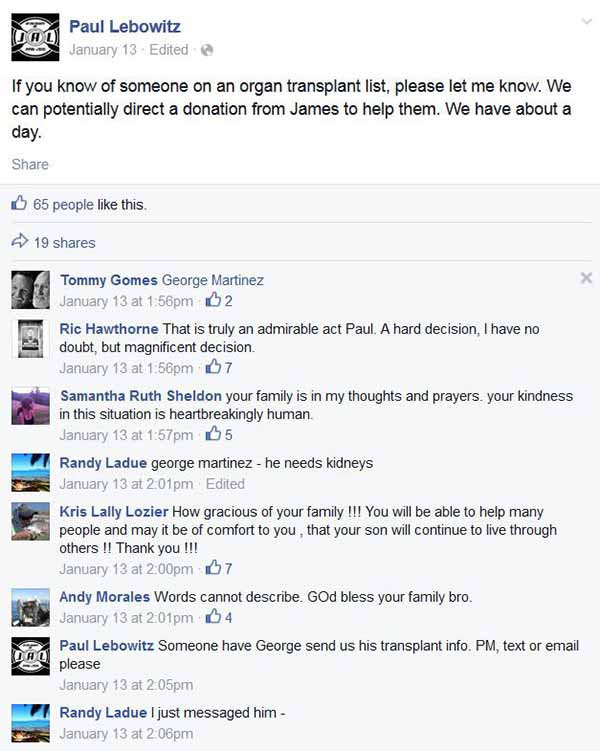San Diego, California - In January 2015, the lives of more than 60 people changed forever when Paul and Susan Lebowitz made the decision to donate their son’s organs and body tissue to recipients across the United States.
That month their beloved son James had suffered a fatal brain aneurysm at his university dormitory at Cal Poly Pomona. Doctors informed the parents that James’ life could not be saved and suggested organ donation.
In shock and grief, Paul posted a message to Facebook announcing the loss of 18-year-old James, “I don’t want to say goodbye, I thought we had a whole lifetime together.”
After discussion with his wife, a second Facebook message offered the possibility of organ donation.

“If you know someone on an organ transplant list, please let me know,” posted the father. “We can potentially direct a donation from James to help them. We have a day.”
Luckily, a man named George Martinez and his longtime friends Tommy and Randy were among Facebook’s 1.3 billion registered users. The men read Paul’s post and immediately replied by tagging and suggesting George as a potential recipient. Minutes later, a connection was made.
Martinez is a 15-year Navy veteran who works as a substance abuse assessor for the County of San Diego Office of the Public Defender. He counsels people with substance abuse issues to get the help they need. George’s life was split between work and undergoing continuous medical treatment for kidney failure.
For 3.5 years, Martinez sat through dialysis from 6 p.m. to 3a.m. three days a week. He would sleep for a few hours and then go to work. George was looking at an additional 2.5 years of dialysis before his turn could come up on the transplant list.
“My family members were not a match for an organ donation,” said Martinez. “My friends that tried were not a match either. I don’t think I could have waited another 2.5 years. I felt my body was really getting weak. It was getting hard to go to work. I’m more surprised than anybody that Facebook came to my aid.”
After hearing Martinez’s story, the Lebowitzs knew that helping George would not only save his life, but it would also help hundreds of other people he counseled on how to overcome addiction and return to a healthy lifestyle.
“It hit me in an instant as we watched over our son, that someone we know, or one step away from us, might be on the transplant list,” said Paul. “For my wife and I, there was no choice to be made. My son could help others. He liked to help people feel good and to fix problems. I have no doubt that James would want to do this.”
The amount of time a patient waits on a transplant list varies by geographic location. In San Diego, the average wait is five to seven years. In 2014, there were more than 20,000 people waiting for a kidney transplant in California—but only 2,000 people received one. More than 100,000 people in the U.S. are waiting for a kidney.
“We are in desperate need for lifesaving organ transplants in the United States,” said Dr. Kristin Mekeel, surgical director of the Kidney and Pancreas Transplantation Program at UC San Diego Health System. “Right now, there are more than 120,000 people listed for organ transplants but only 24,000 transplants are done per year. The number of patients on the transplant list grows longer every year, but the number of donors remains static. The only way we can make up the difference is having more donations.”
George underwent a successful kidney transplant surgery at UC San Diego Medical Center, the largest kidney transplant program south of Los Angeles.
“Wow—UC San Diego—what a team. For the first three days after the surgery, I thought I was the only patient in the hospital. I don’t think I went five seconds that I pressed a button that a nurse was not there,” said Martinez. “The team kept me informed of everything.”
Martinez’s health has improved each day, allowing him to participate in a paddle out memorial service at La Jolla Shores to honor James and his lifesaving gift. Dozens of people on kayaks, boards and a boat joined the Levowitzs to say thank you and goodbye to a young man who helped more people than he’ll ever know.
“My commitment to the Lebowitz family is to get well, take care of this kidney and continue to help people,” said Martinez. “I want to help continue James’ legacy of caring.”
James saved Martinez and four additional people who were matched through the organ donation waiting list. A 50-year-old California man received James’ second kidney while a 60-year-old Californian was given his liver. A Nebraska man in his 30s was gifted James’ lungs and, fittingly, an 18-year-old Californian received his heart.
“Not only are you helping individuals, but each one of these people that James saved has a family and friends,” said Paul. “We’re really talking about touching a thousand people or more. You should register to be an organ donor.”
Tissue banks have a very limited supply of donated skin, bone, heart valves, tendons and corneas—making James a hero to many people. Tissues from his corneas have helped two people see again.
“I call James Lebowitz my angel,” said Martinez. “I cannot imagine what they went through to make the decision to help others through their loss. I would encourage people to please be organ donors. An act of kindness and love can go so far.”
